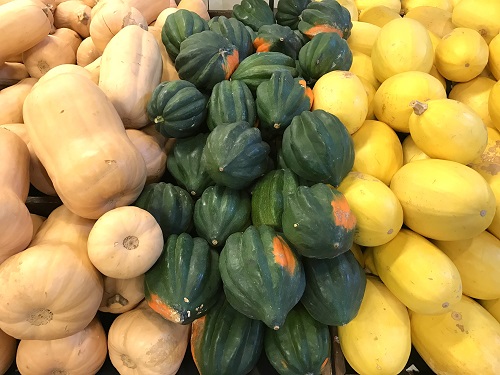Food Facts Friday: Winter Squash
Fall is one of my favorite times of the year. I love the color of the changing leaves, the cooler weather, and the anticipation of the winter holidays. I ventured out to my local farm stand this weekend and was happy to see the variety of winter squash that was available…a true indication that fall has arrived.

Winter squash is beautiful. It comes in a variety of shapes and sizes, can have beautiful bumpy textured skin, and comes in many colors ranging from yellow to orange to dark green or multi-colored. Winter squash is part of the Cucurbitaceae “gourd” family.
Compared to summer squash, winter squash has a hard shell, denser flesh, and richer flavor. The most common varieties of winter squash are acorn, butternut, delicata, hubbard, pumpkin, and spaghetti. Winter squash is a fruit, but for cooking and eating purposes we treat it like a vegetable.
Nutrients in Winter Squash
Nutritionally, winter squash is a source of beta carotene, fiber, magnesium, Vitamin B6 and Vitamin C. It is naturally low in sodium and phosphorus. Winter squash is high in potassium (1/2 cup cooked contains 250 to 445mg potassium) except for spaghetti squash which has only 91mg of potassium in a 1/2 cup cooked portion. Because of its potassium content, winter squash may not be a good choice to eat regularly depending on your stage of chronic kidney disease and if you are on a potassium restriction. Make sure to check with your renal dietitian for cooking methods and safe portion sizes.
Spaghetti squash, however, is very versatile and can be used as a side dish or incorporated into a soup or main dish easily. Try one of these great recipes containing spaghetti squash this fall.

Additional Kidney Diet Resources
Visit DaVita.com and explore these diet and nutrition resources:
- DaVita Food Analyzer
- Today’s Kidney Diet Cookbooks
- DaVita Dining Out Guides
- DaVita Kidney-Friendly Recipes
- Diet and Nutrition Articles
- Diet and Nutrition Videos
- Kidney Smart® Virtual Classes
This article is for informational purposes only and is not a substitute for medical advice or treatment. Consult your physician and dietitian regarding your specific diagnosis, treatment, diet and health questions.

Recent Comments